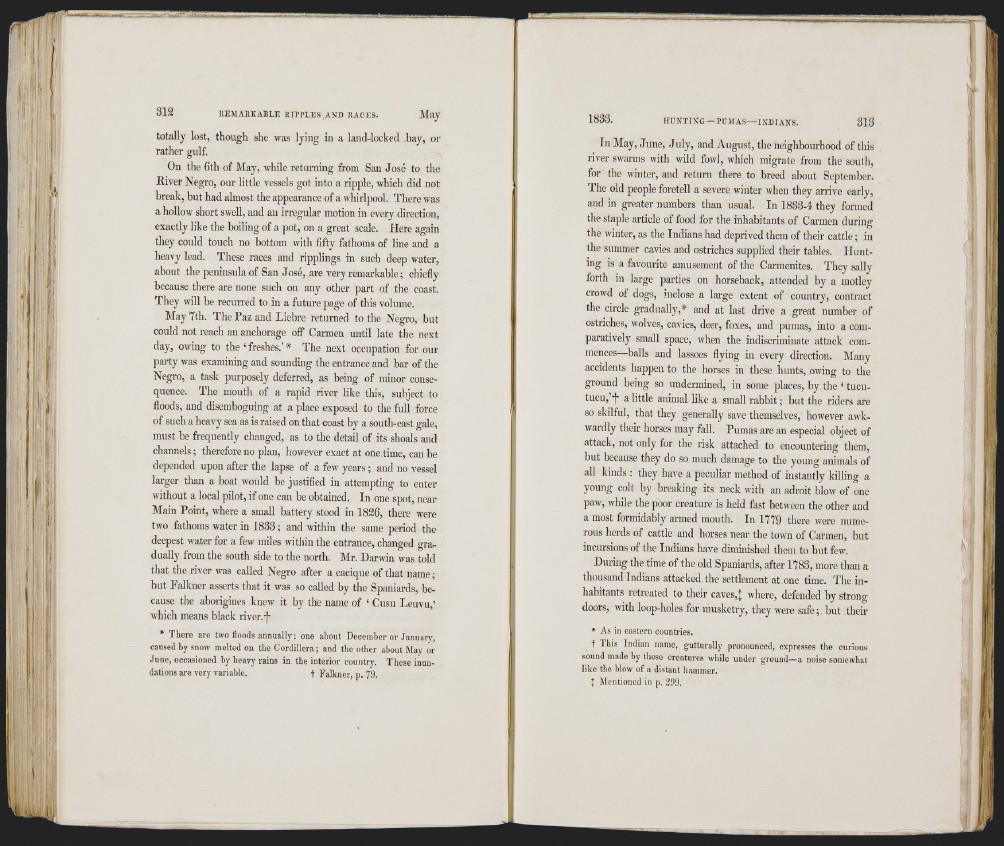
REMARKABLE RIPPLES AND RAGES.
i l t
I
M Ir
■ ' ii
1 1
May
totally lost, though she was lying in a land-locked hay, oi-
rather gulf.
On the 6'th of May, while returning from San José to the
Iliver Negro, our little vessels got into a ripple, which did not
hreak, hut had almost the appearance of a whirlpool. There was
a hollow short swell, and an irregular motion in every direction,
exactly like the hoiling of a pot, on a great scale. Here again
they could touch no bottom with fifty fathoms of line and a
heavy lead. These races and ripplings in such deep water,
about the peninsula of San José, are very remarkable ; chiefly
hecause there are none such on any other part of the coast.
They will he recurred to in a future page of this volume.
May 7th. The Paz and Liehre returned to the Negro, but
could not reach an anchorage off Carmen until late the next
day, owing to the ‘ freshes.’ * The next occupation for our
party was examining and sounding the entrance and bar of the
Negro, a task purposely deferred, as being of minor consequence.
The mouth of a rapid river like this, subject to
floods, and disemboguing at a place exposed to the full force
of such a heavy sea as is raised on that coast by a south-east gale,
must he frequently changed, as to the detail of its shoals and
channels ; therefore no plan, however exact at one time, can be
depended upon after the lapse of a few years ; and no vessel
larger than a boat would be justified in attempting to enter
without a local pilot, if one can be obtained. In one spot, near
Main Point, where a small battery stood in 1826, there were
two fathoms water in 1833 ; and within the same period the
deepest water for a few miles within the entrance, changed gradually
from the south side to the north. Mr. Darwin was told
that the river was called Negro after a cacique of that name ;
but Palkner asserts that it was so called by the Spaniards, because
the aborigines knew it hy the name of ‘ Cusu Leuvu,’
which means black river.-j-
* There are two floods annually : one about December or January,
caused by snow melted on the Cordillera; and the other about May or
June, occasioned by heavy rains in the interior country. These inundations
ai-e very variable. f Falkner, p. 79.
1833. HUNTING — PUMAS INDIANS. 313
In May, June, July, and August, the neighbourhood of this
river swarms with wild fowl, which migrate from the south,
for the winter, and return there to breed about September.
The old people foretell a severe winter when they arrive early,
and in greater numbers than usual. In 1833-4 they formed
the staple article of food for the inhabitants of Carmen during
the winter, as the Indians liad deprived them of their cattle; in
the summer cavies and ostriches supplied their tables. Hunting
is a favourite amusement of the Carmenites. They sally
forth in large parties on horseback, attended by a motley
crowd of dogs, inclose a large extent of country, contract
the circle gradually,* and at last drive a great number of
ostriches, wolves, cavies, deer, foxes, and pumas, into a comparatively
small space, when the indiscriminate attack commences—
balls and lassoes flying in every direction. Many
accidents happen to the horses in these hunts, owing to the
ground being so undermined, in some places, by the ‘ tucu-
tucu, ! a little animal like a small rabbit; but the riders are
so skilful, that they generally save themselves, however awkwardly
their horses may fall. Pumas are an especial object of
attack, not only for the risk attached to encountering them,
hut because they do so much damage to the young animals of
all kinds : they have a peculiar method of instantly killing a
young colt by breaking its neck with an adroit blow of one
paw, while the poor creature is held fast between the other and
a most formidably armed mouth. In 1779 there were numerous
herds of cattle and horses near the town of Carmen, hut
incursions of the Indians have diminished them to but few.
During the time of the old Spaniards, after 1783, more than a
thousand Indians attacked the settlement at one time. The inhabitants
retreated to their caves,] where, defended by strong
doors, with loop-holes for musketry, they were safe; but their
• As in eastern countries.
t This Indian name, gutturally pronounced, expresses the curious
sound made by these creatures while under ground—a noise somewhat
like the blow of a distant hammer.
i Mentioned in p. 299.
Iv